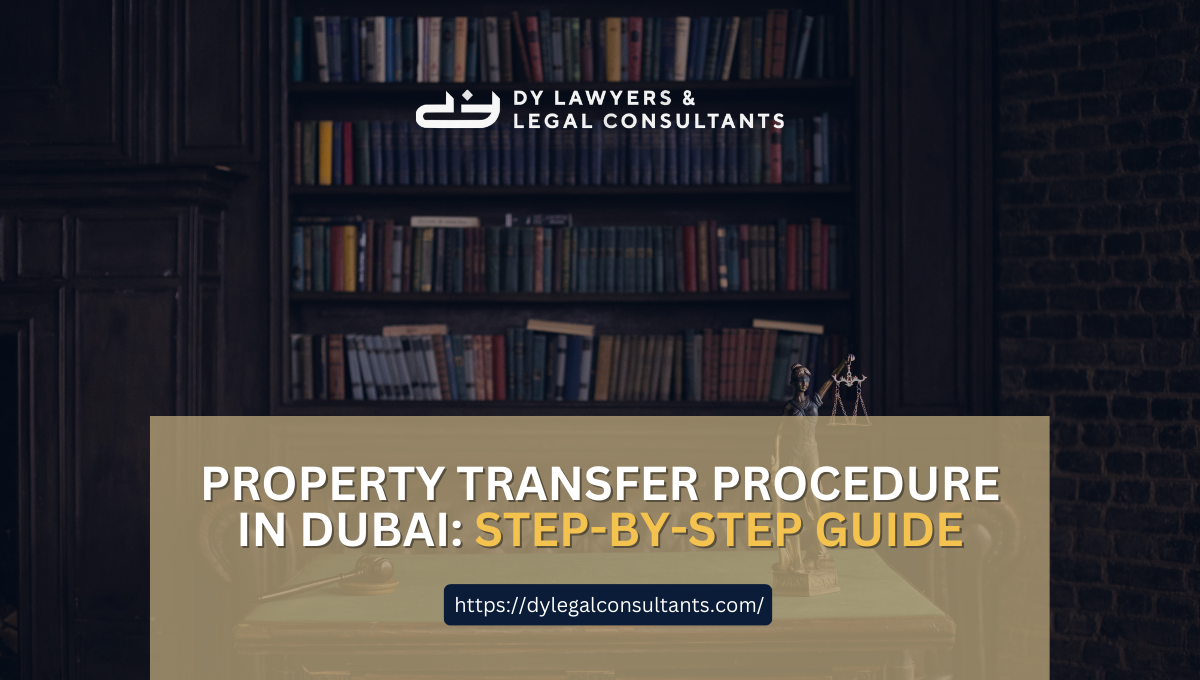Property transfer procedure in Dubai involves a clear legal process overseen by the Dubai Land Department (DLD) and Real Estate Regulatory Agency (RERA). Whether you’re buying, gifting, or inheriting a property, you must follow specific steps to register the title in the new owner’s name. This guide covers who can buy property in Dubai, the land title transfer procedure, required documents and fees, and special cases like transfers between family members or after death.
At each stage, it’s wise to work with experienced property lawyers. Property lawyers in Dubai can review contracts, verify titles, and ensure a smooth transfer.
Also Read: Real Estate Dispute in Dubai
Who Can Buy Property in Dubai?
Dubai law allows wide ownership rights for buyers:
1) UAE Nationals
UAE citizens have full freehold ownership of property and land anywhere in Dubai.
2) Expatriates & Foreigners
Non-residents and expatriate residents may buy freehold property in designated freehold zones without restriction. This means they gain 100% ownership of the property and land. Popular freehold communities include Downtown Dubai, Dubai Marina, and Palm Jumeirah.
3) GCC Citizens
Citizens of Gulf Cooperation Council (GCC) countries generally have similar rights to UAE nationals. They can own property in more areas (freehold and long-term leasehold) under certain conditions.
4) Leasehold Ownership
In non-freehold areas, UAE residents and GCC nationals can acquire leasehold rights (usually up to 99 years). Foreigners outside these rules typically cannot directly own those properties.
5) No Age Limit
Anyone can own property; there is no minimum age requirement. However, minors may need a legal guardian to sign documents on their behalf.
Each buyer must present valid identification (UAE passport or Emirates ID for citizens, passport and visa copy for expats) and comply with any area-specific rules. For example, developers may require Ejari (Dubai tenancy) registration for buyers who are leasing prior to full ownership. In all cases, title transfer is done through the DLD to make ownership legally binding.
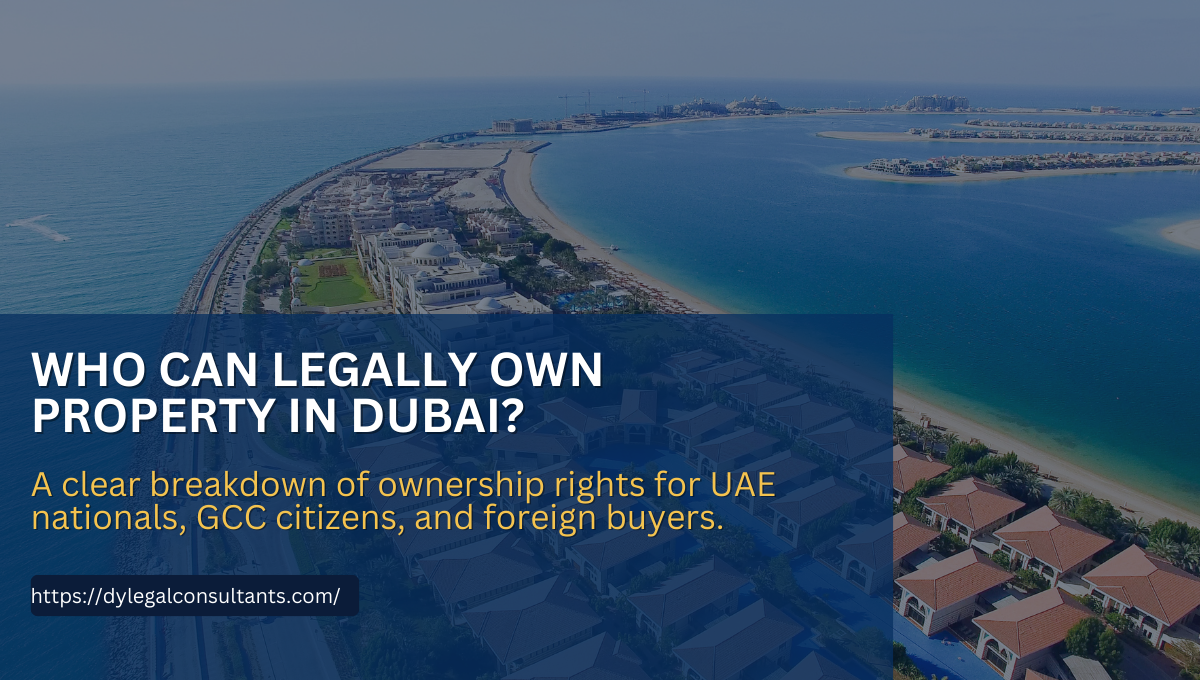
Also Read: Construction Contract Lawyers in Dubai
Step-by-Step Transfer Process
The property transfer process in Dubai follows a series of key steps. Below is an overview; each step usually involves signing a document or obtaining a certificate to protect both buyer and seller:
1) Memorandum of Understanding (MoU) / Sale Agreement
The process typically starts with a preliminary contract. For off-plan or secondary sales, parties sign either an MoU or a Sale and Purchase Agreement (SPA) outlining the basic terms, property details, agreed price, payment schedule, handover date, and penalties. A deposit (often 10% of the price) is paid at this stage. The MoU/SPA itself protects each side by setting these terms, though the MoU is not a final title transfer.
2) Due Diligence
After signing the preliminary agreement, the buyer (or the buyer’s lawyer) performs due diligence to ensure a clean title. This includes verifying the seller’s title deed at DLD to confirm ownership and check for any mortgages or legal disputes. The buyer also checks that no service charges or utility bills are outstanding so as not to inherit debts. This step may involve hiring a conveyancer or using document verification services.
3) No Objection Certificate (NOC)
For most secondary market sales, the seller must obtain an NOC from the property developer. The NOC is a letter from the developer stating that all fees (maintenance, service charges, etc.) are paid and the developer has no objections to the sale. This protects the buyer from any hidden liabilities. The seller requests the NOC by submitting the title deed, a copy of the signed MoU, and proof of payments to the developer. The developer typically issues the NOC within a few days, often for a fee (common range AED 500–5,000).
4) Final Sale Agreement
Once the NOC is obtained, the parties finalize the Sale Agreement (if not already done). This binding contract details everything from the final sale price and remaining payments to contingencies (e.g., mortgage approvals, necessary repairs). It is usually signed at a DLD-authorized trustee’s office or the DLD itself. Both buyer and seller should review it carefully (a lawyer’s help is recommended) to ensure compliance with UAE law and inclusion of all agreed terms.
5) Payment & DLD Transfer
At a scheduled DLD or trustee office appointment, the buyer pays the remaining balance (often by manager’s cheque) directly to the seller. Simultaneously, the buyer pays the official transfer fee, which is typically 4% of the property’s value, along with administrative charges. For example, if the property is AED 1,000,000, the transfer fee is AED 40,000. Once payment is confirmed, the DLD processes the transfer. Required documents at this stage include the original title deed, developer’s NOC, the signed sale agreement, and both parties’ IDs.
6) Title Deed Issuance
After verifying all documents and payment of fees, the DLD officially registers the buyer as the new owner. A new title deed is issued in the buyer’s name. This deed is the ultimate proof of ownership and lists details like property size and plot number. The DLD hands over this deed (usually within the same session or a few days), completing the transfer.
Throughout these steps, it’s common to work with a real estate attorney to ensure each requirement is properly met. For example, attorneys often accompany clients to the DLD or use an e-service (REST app) to streamline the process. Keeping copies of all paperwork (MoU, NOC, receipts) is important, and many buyers also arrange title deed registration through a Dubai-licensed trustee, which can save time and paperwork.
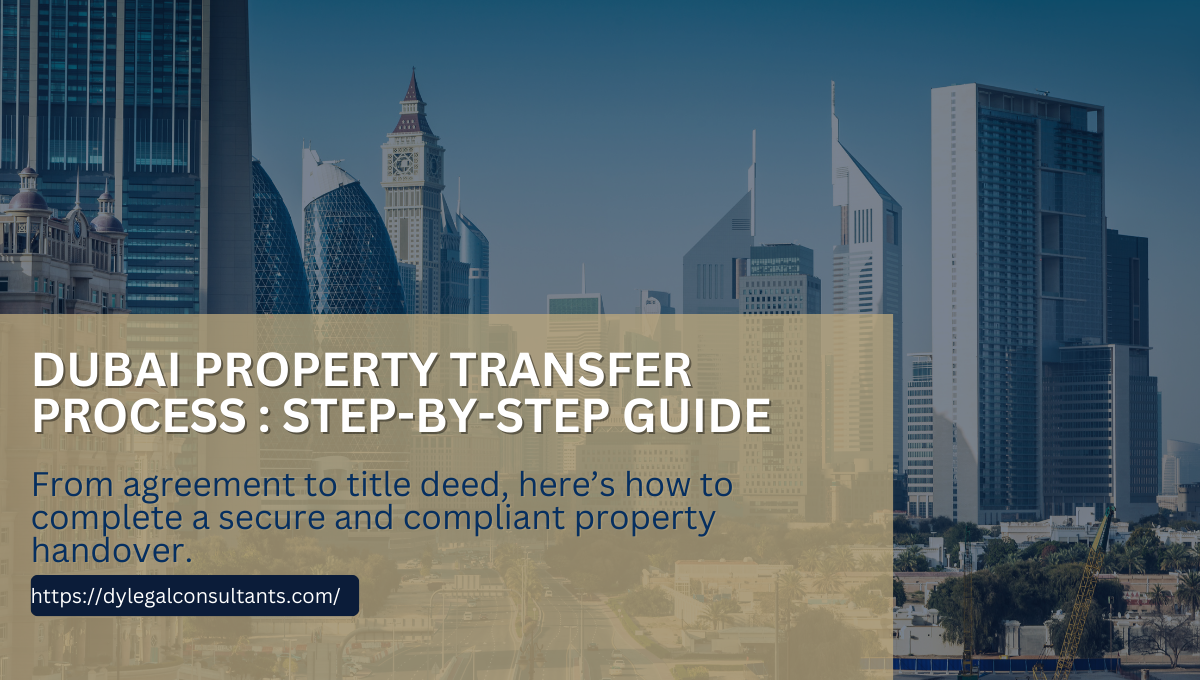
Documents & Fees (Land Transfer Process)
When you visit the DLD to register the transfer, you must submit a set of documents and pay specific fees. Key requirements include:
1) Required Documents:
- Original Title Deed: The seller’s current title deed (if not lost).
- Developer’s NOC: The no-objection certificate obtained by the seller, confirming all dues are paid.
- Signed Sale/Purchase Agreement: A copy of the final sale contract showing buyer and seller signatures.
- IDs/Passports: Valid passports (and visas) or Emirates ID cards of both buyer and seller for identification.
- (If Applicable) Power of Attorney: If either party is acting through an agent, a notarized power of attorney is needed.
- Additional Certificates: In special cases (e.g., mortgaged property, company-owned property), extra NOCs or board resolutions may be required.
2) Transfer Fees
The DLD charges several fees as part of the land transfer process:
- Transfer Fee: 4% of the sale price, paid by the buyer.
- Administration Fee: A fixed fee (currently AED 580) for DLD services.
- Title Deed Fee: AED 250 for issuing the new title deed.
- NOC Fee: If not already paid by the seller, developers typically charge AED 500–5,000 for the NOC (paid by the seller).
- Trustee/Service Fees: If using an authorized trustee center, additional trustee fees may apply (commonly around AED 2,000–4,000 depending on property value).
| Fee Type | Amount |
| DLD Transfer Fee | 4% of property value |
| DLD Administration Fee | AED 580 |
| Title Deed Issuance Fee | AED 250 |
| Developer No-Objection (NOC) | AED 500–AED 5,000 (typical range) |
In practice, for a property valued at AED 1,000,000, the DLD transfer fee is AED 40,000, plus AED 580 + AED 250 in other DLD charges (AED 40,830 total), before any trustee or developer fees. Buyers should budget for these costs as part of closing.
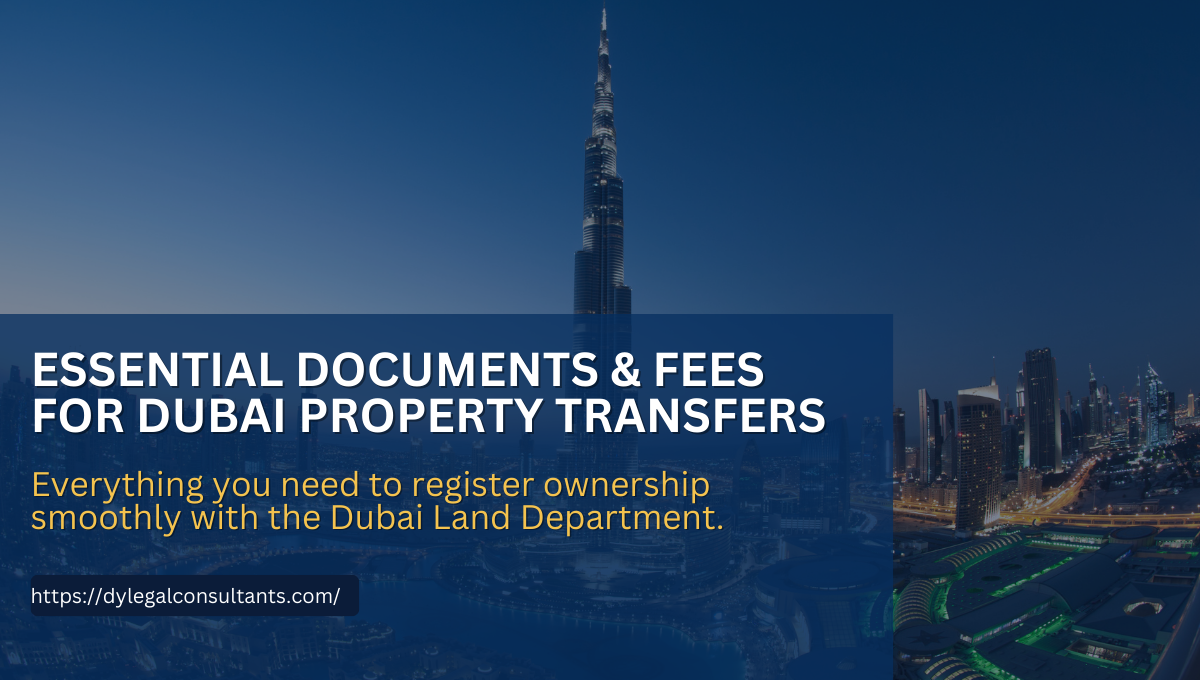
Family Transfers & Gifts
Special transfer procedures apply when the property is transferred as a gift or inherited by family members. These procedures for transfer of property from father to son, mother to son, and transfer after death essentially follow the DLD process, with additional documentation:
1) Transfers to Heirs (After Death)
When a property owner dies, their heirs must first obtain a succession or inheritance certificate from the court. This legal document names the heirs and approves the estate distribution. With the inheritance certificate and a court order, the heirs apply to the DLD to update the property title in their names.
Required documents include the succession certificate, death certificate, and a letter from the courts addressed to the DLD authorizing the transfer to the heirs. Once approved, the DLD issues new deeds for each heir. (Note: In Dubai, even foreign owners’ estates can be probated; expatriate heirs often need these UAE procedures to inherit property.)
2) Transfer from Parents to Children
Gifts or transfers between parents and children follow a similar process. If a parent (father or mother) wants to transfer property ownership to their son or daughter, they must register it as a gift transfer at DLD. The process requires a gift deed (prepared in English and Arabic) and proof of relationship (e.g., family book extract or birth certificate).
The developer’s NOC is still needed. Essentially, you apply via DLD’s gift registration service, providing all the family documents (marriage or birth certificates with embassy attestation). This is the standard procedure for the transfer of property from father to son or mother to child; it’s treated as a free transfer to a first-degree relative.
3) Gifting Property in Dubai
More generally, any gift transfer of property in Dubai (to a spouse, child, or parent) must go through DLD’s official procedure. The key requirements are a valid gift deed, developer NOC, proof of kinship, and clearing any mortgage via a bank release letter. The Dubai REST app or a trustee can handle the paperwork. The fees for a gift transfer are nominal, about 0.125% of the property value (minimum AED 2,000), plus the AED 250 title deed fee. These are much lower than a sales fee (because no actual sale occurs).
In all family transfers, it’s crucial to prove the relationship to the DLD (via authenticated documents) and follow the court or developer protocols. For example, if the property is still under a developer’s control, you’ll also submit the signed deed and any required statements. Engaging a lawyer or a trustee service can simplify these steps and avoid errors.
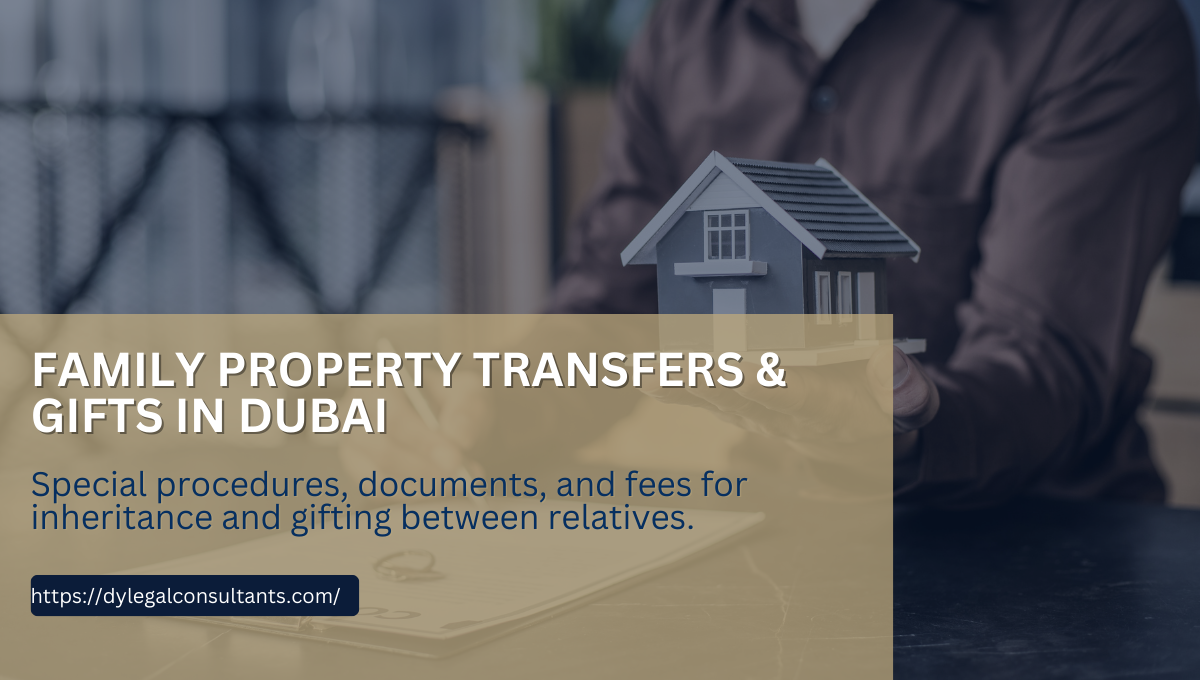
Also Read: Clearer Look at RAK ICC Foundations and Their 2025 Updates for Global Wealth
Why Hire a Property Lawyer in Dubai?
Dubai’s real estate regulations can be complex (off-plan sales, Ejari leases, foreign ownership rules, etc.), so hiring a qualified real estate lawyer in Dubai is highly recommended. A lawyer will ensure your interests are protected at every step.
For instance, our DY Legal Consultants team checks titles and encumbrances before you pay, drafts or reviews the sale agreement to include all safeguards, and guides you through RERA and DLD procedures. We also handle related services like contract drafting and document attestation. In practice, a lawyer avoids costly mistakes (such as missing a clause or skipping a required NOC) by double-checking every document. As our firm’s experience shows, a well-prepared transfer (with clear contracts and all legal requirements met) helps avoid disputes and delays.
For expert assistance, contact DY Legal Consultants; we provide dedicated property law services, from due diligence to DLD registration. Our property lawyers in Dubai are ready to help make your transfer smooth and legally sound.

FAQs
How do I transfer ownership of a property in Dubai?
You follow the official DLD process: sign a sale agreement (SPA/MoU), obtain a developer’s NOC, and pay the required fees at the DLD for registration. In practice, this means both parties meet at the Land Department (or trustee centre), the buyer pays the remaining price and the 4% transfer fee, and then the DLD issues a new title deed in the buyer’s name. All parties should ensure contracts and IDs are ready. It’s strongly advised to involve a legal advisor to prepare documents and represent you at the DLD.
How much are Dubai property transfer fees?
The Dubai Land Department charges a 4% transfer fee on the property’s sale price. In addition, there is an AED 580 administrative fee and an AED 250 title deed issuance fee. The seller typically pays for the developer’s NOC (around AED 500–5,000), but this can be agreed otherwise. For example, on an AED 2,000,000 sale, the transfer fee is AED 80,000, plus AED 830 in fixed DLD fees (AED 580 + 250).
What is the process of property handover in Dubai?
For an off-plan purchase, the developer first issues a completion notice, then you inspect the property (a “snag” inspection). After any defects are fixed, the developer issues a final handover notice, and you make the last payment. Only then do you get the keys. For a ready property, handover effectively occurs when the title is transferred at the DLD: after settlement of payment and transfer formalities, the buyer takes possession on the agreed handover date. In all cases, ensure the developer provides all required documents (e.g., Ejari-ready utilities) before accepting the keys.
What is the easiest way to transfer property?
The easiest and only legal way is to follow the DLD-regulated steps: prepare the SPA/MoU, get the NOC, and register the transfer with the Land Department. Using the Dubai REST app or a DLD-authorized trustee can speed up the process. Always make sure all payments are traceable (bank cheques or transfers) and that contracts are complete. Hiring an experienced lawyer or broker to handle the paperwork makes the process smoother and minimizes delays.
How to verify a title deed in Dubai?
To verify a title deed, check the official record with the DLD or use RERA’s online services. This confirms the seller is the legitimate owner and that there are no mortgages or liens on the property. You (or your lawyer) can request a title deed certificate at the DLD using the property’s title number. Lawyers often use their document verification services to double-check the deed and encumbrances before completing a purchase.
What is the Dubai Land Department fee for issuing title deeds for a compound of 15 villas?
The DLD charges AED 250 per title deed issued. If you need title deeds for 15 villas, the total DLD title deed issuance fee would be 15 × AED 250 = AED 3,750 (not including the standard 4% transfer fees or other charges).
Disclaimer: The content in this article is provided for informational purposes only and does not constitute legal advice.

